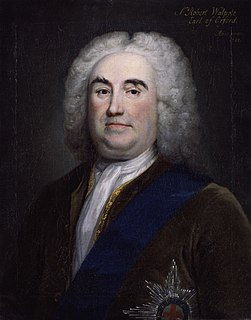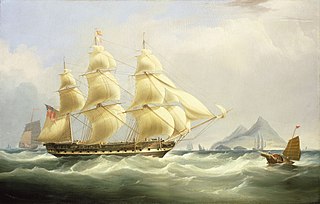Five ships named Houghton, the first for Houghton Hall, the family home of Sir Robert Walpole, served the British East India Company between 1724 and 1799:

Houghton Hall is a country house in the parish of Houghton in Norfolk, England. It is the residence of David Cholmondeley, 7th Marquess of Cholmondeley.

Robert Walpole, 1st Earl of Orford,, known between 1725 and 1742 as Sir Robert Walpole, was a British statesman who is generally regarded as the de facto first Prime Minister of Great Britain.

The East India Company (EIC), also known as the Honourable East India Company (HEIC) or the British East India Company and informally as John Company, Company Bahadur, or simply The Company, was an English and later British joint-stock company. It was formed to trade in the Indian Ocean region, initially with Mughal India and the East Indies, and later with Qing China. The company ended up seizing control over large parts of the Indian subcontinent, colonised parts of Southeast Asia, and colonised Hong Kong after a war with Qing China.
- Houghton (1724 EIC ship) was launched in 1724 and sold in 1736 after four voyages. She then traded with North America and the West Indies.
- Houghton (1738 EIC ship) was launched in 1738 and made three voyages for the EIC before she was sold in 1749 for service as a West Indiaman.
- Houghton (1751 EIC ship) was launched in 1751 and made four voayages for the EIC before she was sold in 1764: she was still trading in 1766.
- Houghton (1766 EIC ship) was launched in 1766 and made four voyages for the EIC before she was sold in 1778. She became an armed escort and transport ship until thee Combined French and Spanish fleet captured her in 1780.
- Houghton (1782 EIC ship) was launched in 1782 and made six voyages for the EIC before she was sold in 1799. She foundered in 1803.

West Indiaman was a general name for any merchantman sailing ship making runs from the Old World to the West Indies and the east coast of the Americas These ships were generally strong ocean-going ships capable of handling storms in the Atlantic Ocean. The term was not restricted to ships coming from England. Danish, Dutch, and French ships (e.g., Indispensable were also referred to as West Indiamen.

Houghton was launched in 1782 and made six voyages as an East Indiaman for the British East India Company (EIC). In 1794 she was part of an EIC squadron that had some success against French privateers and naval vessels in the Sunda Strait, and then in 1796 she participated as a transport in the British capture of St Lucia. She was sold in 1799 and her owner took her out to India to work in the tea trade between India and China. She foundered in 1803.
| This article includes a list of ships with the same or similar names. If an internal link for a specific ship led you here, you may wish to change the link to point directly to the intended ship article, if one exists. |

